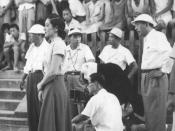This is an 'Art of Film' critique of (Japanese director) Yasojiru Ozu's 'Good Morning'.
My critique is called 'Ozu's Reductionism', and focuses mainly on how Ozu uses reductionist techniques in his filmmaking style, such as lowered camaera positioning, and his empty spaces. Three (3) footnotes are used as sources.
Yasujiro Ozu is probably Japan's most talented directors, but unfortunately one of the least known ones by the public. He succeeded in producing many films, all which deal with the study of the Japanese family and how it operates, changes and evolves as a unit. He has been labeled "the most Japanese of all directors"2, and is known to have left a very influential mark on Japanese cinema. In Ozu's "Good Morning", it deals with two overlaying plots, one in which involves two young brothers who take a oath of silence until their father gets them a TV set, and another which deals with misplaced money, in which the neighbors start to point fingers accusingly.
The title "Good Morning", reflects the story in a way which it refers to the over politeness exaggeration that is typical, and engaged consistently in Japanese society, and which drives a neighbor to think something is wrong because the boys didn't say 'Good Morning" due to their oath of silence. In this critique, I shall discuss the techniques that are used in the film, and what they contribute to the imagery produced.
I formulated my own directing style in my own head, proceeding without any unnecessary imitation of others... for me there was no such thing as a teacher. I have relied entirely on my own strength.1
Yasojiro Ozu
Ozu insisted that he had no support of influence as other directors do in filming, instead relied simply on him-self to formulate new ways of capturing...



Nice
I enjoyed your essay; and, I found it refreshing that you cited your sources, unlike many others, and included a prologue to the essay. Good work.
1 out of 1 people found this comment useful.